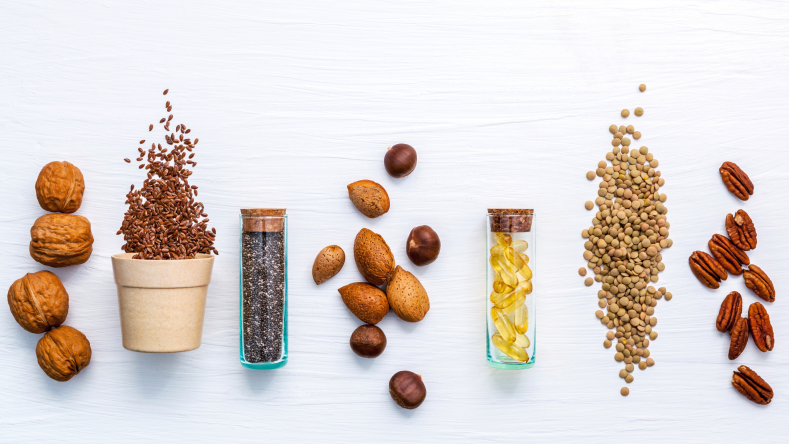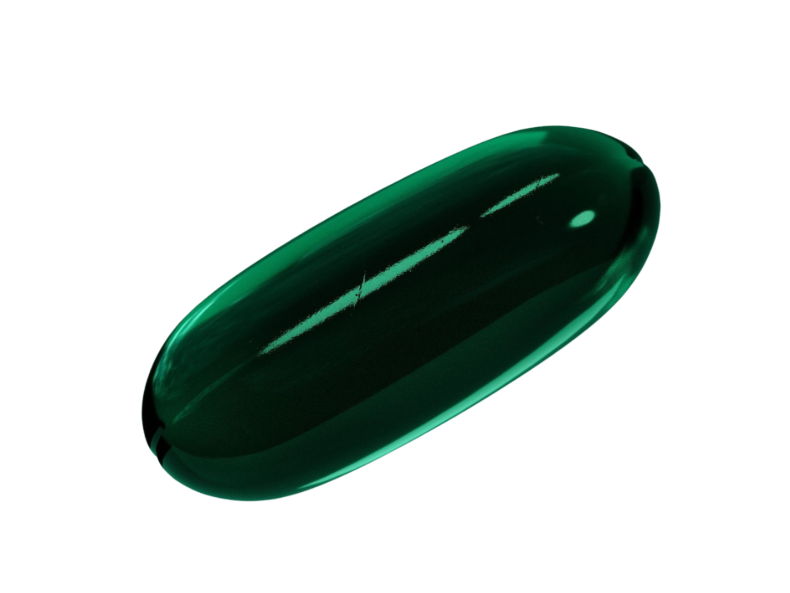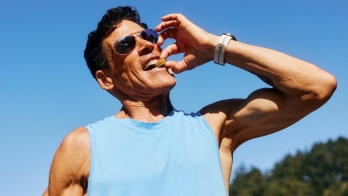How to get omega-3 on a vegan diet
Even though omega-3 fatty acids are essential for health, your body can’t produce them naturally. Since many omega-3 dietary sources are animal-based, you may find it challenging to meet your needs on a vegan diet. Here’s how you can get enough omega-3 on a vegan diet with help from walnuts, chia seeds, and Iwi.

If you’re looking for ways to boost health, improve inflammation, and positively impact cardiovascular health, go no further than omega-3 fatty acids. They are essential for health but can only be obtained through diet since you don’t naturally produce them. While many of these sources are animal-based, you can still reap the benefits of a vegetarian or vegan diet. But before we explore some vegan omega-3 foods (and subsequent supplement options), let’s understand why omega-3s are important, how they benefit health, and what experts recommend for daily intake.
What are omega-3 fatty acids?
Omega-3 fatty acids are polyunsaturated fats that play essential roles in hormone production, inflammation, brain health, immunity 1 5 1 2
The three main omega-3 fatty acids are ALA, EPA, and DHA [ 5
ALA (alpha-linolenic acid): This essential fatty acid is found in most plant foods and has been linked to a reduced risk of death from heart disease [
9
].EPA (eicosatetraenoic acid): EPA occurs naturally in cold-water fatty fish (like salmon, mackerel, tuna, and sardines), seaweed, certain algae, and other animal products like enriched eggs, and meat and dairy from grass-fed animals. Research suggests that EPA may reduce inflammation and help with symptoms of depression [
10
].DHA (docosahexaenoic acid): DHA is also found in animal products (particularly cold-water fatty fish and shellfish) and has been shown to have positive effects on brain function, heart health, arthritis, high blood pressure, type 2 diabetes, and some cancers [
11
].
How much omega-3 should you take each day?
While there are no official RDAs (recommended dietary allowances) for omega-3s, the IOM has established AIs (adequate intakes) for all ages based on omega-3 intakes in healthy populations [ 3 3
An omega-3 deficiency has been associated with depression, heart disease, arthritis, and various cancers [
6
,7
,8
].

Dietary sources of omega-3 fats
Since your body can’t produce all omega-3 fatty acids on its own, you must rely on dietary sources and/or supplements to meet your needs.
Fatty fish (such as salmon, trout, tuna, and sardines) and fish oil are excellent sources of DHA and EPA, while nuts, seeds, and flaxseed oil are rich in ALA [ 3 4
Seaweed (134 mg per ounce)
Chlorella (100 mg per 3 grams)
Spirulina
Brussels sprouts (135 mg per ½ cup cooked)
Flaxseeds (2.4 g per tablespoon)
Walnuts (2.6 g per ounce)
Chia seeds (5 g per ounce)
Hemp seeds (1 g per tablespoon)
Beans (100 mg per ½ cup)
Edamame (280 mg per ½ cup)
Vegan “fish oil” supplements

Introducing Iwi, Elo’s new vegan omega-3 product
Another great way to get your Omega-3s is with Iwi
Here are some other benefits of Iwi:
Bioavailability. The omega-3 fats found in Iwi have been shown to be 50% more bioavailable than those in fish or krill because they’re bound to glycoproteins and phospholipids [
12
].Dosage. Each Iwi capsule contains 250 mg of omega-3s and 150 mg of EPA.
Sustainability. Since Iwi is farmed on land, it doesn’t disrupt fragile aquatic ecosystems like other marine omega-3 products. Instead, it’s farmed in saltwater in New Mexico and Texas, meaning that 97% of water entering the system is reused.
Heart health. Studies have found that Iwi’s vegan omega-3 reduces VLDL (bad) cholesterol levels by 25% after 12 weeks of supplementation (1g/day) [
13
].
Summary
Omega-3 fatty acids are essential to overall health, as they play important roles in hormone production, inflammation, brain health, fetal development, and blood clotting. While you can consume them through both animal- and plant-based sources, you may find it challenging to meet your needs on a vegan diet. However, this feat isn’t impossible, as you can add certain omega-3 rich foods (such as walnuts, chia seeds, seaweed, and algae) to your diet and include Iwi supplements to fill in the gaps. As such, it’s possible for you to meet your omega-3 needs sans seafood.
Disclaimer: The text, images, videos, and other media on this page are provided for informational purposes only and are not intended to treat, diagnose or replace personalized medical care.
Key takeaways
Omega-3 fatty acids are polyunsaturated fats that are essential for health, and play important roles in hormone production, inflammation, brain health,
immunity
, fetal development, and blood clotting [1
,5
].Experts tend to agree that 250–500 mg of combined EPA and DHA is enough to maintain overall health [
3
].Fatty fish (such as salmon, trout, tuna, and sardines) and fish oil are excellent sources of DHA and EPA, while nuts, seeds, and flaxseed oil are rich in ALA [
3
].Iwi
is Elo’s new ground-breaking vegan omega-3 product, and has been shown to reduce total cholesterol without decreasing HDL (good cholesterol).
References
“Omega-3 Fatty Acids: An Essential Contribution.” The Nutrition Source, 22 May 2019,
https://www.hsph.harvard.edu/nutritionsource/what-should-you-eat/fats-and-cholesterol/types-of-fat/omega-3-fats/
.Mori, T. A., & Beilin, L. J. (2004). Omega-3 fatty acids and inflammation. Current atherosclerosis reports, 6(6), 461–467.
https://doi.org/10.1007/s11883-004-0087-5
U.S. Department of Health and Human Services. (n.d.). Office of dietary supplements - omega-3 fatty acids. NIH Office of Dietary Supplements. Retrieved January 24, 2022, from
https://ods.od.nih.gov/factsheets/Omega3FattyAcids-HealthProfessional/
Omega-3 fatty acids and plant-based diets. Physicians Committee for Responsible Medicine. (n.d.). Retrieved January 24, 2022, from
https://www.pcrm.org/good-nutrition/nutrition-information/omega-3
Swanson, D., Block, R., & Mousa, S. A. (2012). Omega-3 fatty acids EPA and DHA: health benefits throughout life. Advances in nutrition (Bethesda, Md.), 3(1), 1–7.
https://doi.org/10.3945/an.111.000893
Grosso, G., Galvano, F., Marventano, S., Malaguarnera, M., Bucolo, C., Drago, F., & Caraci, F. (2014). Omega-3 fatty acids and depression: scientific evidence and biological mechanisms. Oxidative medicine and cellular longevity, 2014, 313570.
https://doi.org/10.1155/2014/313570
Mohebi-Nejad, A., & Bikdeli, B. (2014). Omega-3 supplements and cardiovascular diseases. Tanaffos, 13(1), 6–14.
Freitas, R., & Campos, M. M. (2019). Protective Effects of Omega-3 Fatty Acids in Cancer-Related Complications. Nutrients, 11(5), 945.
https://doi.org/10.3390/nu11050945
Brouwer, I. A., Katan, M. B., & Zock, P. L. (2004). Dietary alpha-linolenic acid is associated with reduced risk of fatal coronary heart disease, but increased prostate cancer risk: a meta-analysis. The Journal of nutrition, 134(4), 919–922.
https://doi.org/10.1093/jn/134.4.919
Liao, Y., Xie, B., Zhang, H., He, Q., Guo, L., Subramanieapillai, M., Fan, B., Lu, C., & McIntyre, R. S. (2019). Efficacy of omega-3 pufas in depression: A meta-analysis. Translational Psychiatry, 9(1).
https://doi.org/10.1038/s41398-019-0515-5
Li, J., Pora, B. L., Dong, K., & Hasjim, J. (2021). Health benefits of docosahexaenoic acid and its bioavailability: A Review. Food Science & Nutrition, 9(9), 5229–5243.
https://doi.org/10.1002/fsn3.2299
Kagan, M. L., West, A. L., Zante, C., & Calder, P. C. (2013). Acute appearance of fatty acids in human plasma – a comparative study between polar-lipid rich oil from the microalgae nannochloropsis oculata and krill oil in healthy young males. Lipids in Health and Disease, 12(1).
https://doi.org/10.1186/1476-511x-12-102
Rao, A., Briskey, D., Nalley, J. O., & Ganuza, E. (2020). Omega-3 eicosapentaenoic acid (EPA) rich extract from the Microalga Nannochloropsis decreases cholesterol in healthy individuals: A double-blind, randomized, placebo-controlled, three-month supplementation study. Nutrients, 12(6), 1869.
https://doi.org/10.3390/nu12061869






